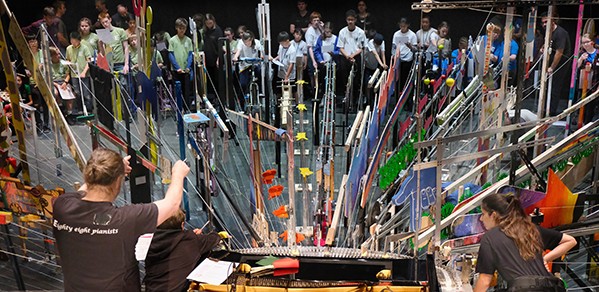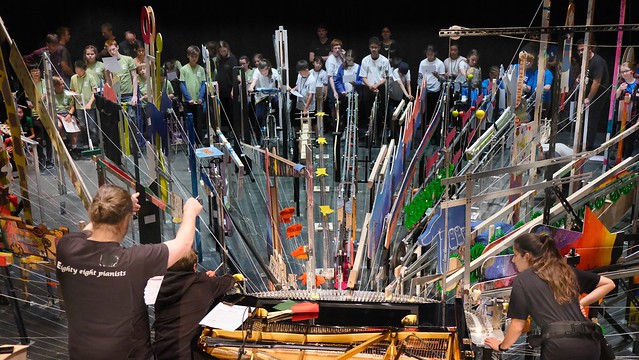
Each year, the Department of Engineering offers a number of apprenticeships for people keen to pursue a career in the field.
I was delighted with the contribution made by the four apprentices who worked with us…Their impressive skills and commitment reflect the strength and depth of the whole workshop system in the Department.
Professor Julian Allwood
The roles allow apprentices to gain hands-on experience of a range of engineering techniques within our large academic research and teaching department, as well as ensuring that they spend 20% of their time completing off-the-job training in order to develop further skills and knowledge.
This summer, four of our apprentices used various mechanical engineering techniques and skills to help produce mechanisms that would allow 88 primary school children to play the same piano at the same time.
The result was a world record-breaking performance held at the ICC in Birmingham, on 19 August 2019, that saw 88 children – one child for each key – collectively play a specifically composed piece of music on the same piano from seven metres away. The 88 Pianists national outreach project was created by Professor Julian Allwood and delivered in collaboration with nine other UK universities with the aim of inspiring the next generation of engineers.
Over half of the mechanisms – designed by the children to help them play the piano keys from a distance – were manufactured at the University of Cambridge with help from Electronics Apprentice Catia Marceneiro Dos Santos, Mechanical Apprentices Harry Agnew and George Palmer, and Senior Technician Daniel Boutell. They used milling, turning, and waterjet cutting to produce metal components from drawings and they were also heavily involved in the mechanisms’ assembly. This included fastening components together, troubleshooting and refining the design. They each contributed great ideas to help make the mechanisms stronger and more user-friendly.
Catia said: “I expected the 88 Pianists project to be a great opportunity to perform jobs outside of my comfort zone as it was a purely mechanical project and no electronics were involved. Being involved in this project allowed me to put into practice the hand fitting techniques learnt at college. It was a great learning experience. I had to integrate into a team that was a lot bigger than usual and this meant I got a fair amount of feedback which I could use for personal improvement. This project helped me develop my communication skills as I had to communicate with people from different backgrounds.”
Harry said: “This was an amazing opportunity to work with academics and researchers and a chance to use and develop the training we received early on in the apprenticeship. I enjoyed being involved in a project through to the end, working through the challenges and seeing the final product.”
George added: “Things started to fall in place and I learnt to concentrate on making one part at a time. I enjoyed working on the project and it has helped me in my work and my hobby learning.”
Professor Julian Allwood said: “88 Pianists drew on the skills of people across the Department of Engineering and I was delighted with the contribution made by the four apprentices who worked with us. They brought many of the individual designs to life, solved problems with the designs as they went along, and on the weekend of the final performance, were invaluable in transporting everything to Birmingham, setting it up and dealing with running repairs during the rehearsals (and performance). Their impressive skills and commitment reflect the strength and depth of the whole workshop system in the Department.”
Find out more about apprenticeships at Cambridge.


